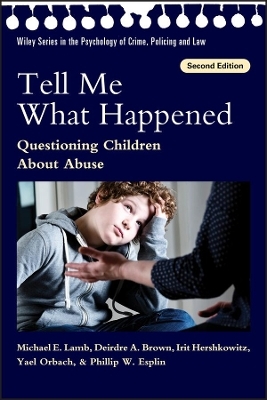
Tell Me What Happened
Wiley-Blackwell (Verlag)
978-1-118-88167-5 (ISBN)
This book updates the previous review of research on children’s testimony—reexamining and readdressing how the quality of information provided by young witnesses is affected by the way they are questioned. Drawing upon both experimental and field studies conducted in different countries, it summarizes evidence supporting the effectiveness of the National Institute for Child Health and Human Development (NICHD) Protocol and showcases the Protocol’s superiority over other current interviewing techniques for eliciting detailed and forensically useful content from child complainants.
Written with both child protection professionals and researchers in mind, Tell Me What Happened: Questioning Children About Abuse offers advice and opinions drawn from actual investigative interviews as well as academic research. Its insightful chapters cover: children’s testimony; interview and questioning strategies; how investigators typically interview alleged victims; the NICHD Investigative Interview Protocols; the impact that following the Protocol has on interviews and children’s responses; interviewing victims under the age of six; interviewing children with developmental disabilities; using tools and props to complement the Protocol; training and maintaining good interviewing practices; and more.
Provides a primary source of guidance practitioners and professionals involved in child protection
Updates guidance for interviewers by adding consideration of emotional and motivational factors to better understand children’s behavior during interviews
Integrates the substantial body of research published over the last decade and reflects upon questions that the field should continue to address
Tell Me What Happened: Questioning Children About Abuse deserves to be read by all practitioners involved in child protection, whether as investigators, interviewers, judges, or lawyers.
Michael E. Lamb, PhD, is Professor of Psychology at the University of Cambridge. Deirdre A. Brown, PhD, is Senior Lecturer in Psychology at the Victoria University of Wellington. Irit Hershkowitz, PhD, is Professor of Social Work at the University of Haifa. Yael Orbach, PhD, worked as a Staff Scientist and senior researcher in the Section on Social and Emotional Development of the National Institute of Child Health and Human Development. Phillip W. Esplin has worked as a forensic psychologist based in Phoenix, AZ for more than 40 years.
About the Authors ix
Series Preface xi
Preface xv
1 Interviewing Children About Abuse: An Overview and Introduction 1
2 Contributions to Children’s Testimony: The Child and the Event 11
3 Contributions to Testimony: Preparation for the Interview and Questioning Strategies 47
4 How do Investigators Typically Interview Alleged Victims? 67
5 The NICHD Investigative Interview Protocols for Young Victims and Witnesses 87
6 When Interviewers Follow the Protocol, What Impact Does it Have on Their Interviewing and on Children’s Responding? 101
7 Interviewing Suspected Victims under Six Years of Age 119
8 Interviewing Children with Developmental Disabilities 137
9 The Revised Protocol: Effectively Supporting Reluctant Witnesses 161
10 Using Tools and Props to Complement the Protocol 189
11 Training and Maintaining Good Interviewing Practice 201
12 Case‐related Outcomes When the Protocol is Used 213
13 Progress to Date and the Challenges Ahead 225
Revised Investigative Interview Protocol: Version 2018 239
References 251
Index 315
| Erscheinungsdatum | 04.10.2018 |
|---|---|
| Reihe/Serie | Wiley Series in Psychology of Crime, Policing and Law |
| Verlagsort | Hoboken |
| Sprache | englisch |
| Maße | 152 x 226 mm |
| Gewicht | 454 g |
| Themenwelt | Geisteswissenschaften ► Psychologie |
| Recht / Steuern ► EU / Internationales Recht | |
| Recht / Steuern ► Strafrecht ► Kriminologie | |
| ISBN-10 | 1-118-88167-2 / 1118881672 |
| ISBN-13 | 978-1-118-88167-5 / 9781118881675 |
| Zustand | Neuware |
| Haben Sie eine Frage zum Produkt? |
aus dem Bereich


